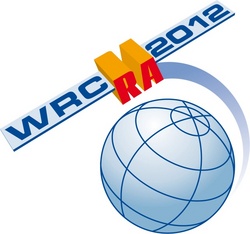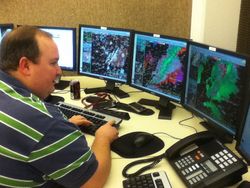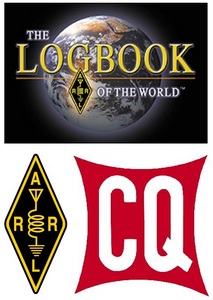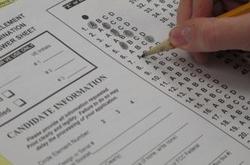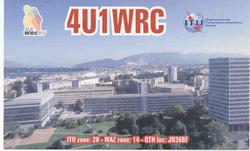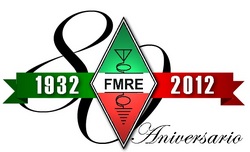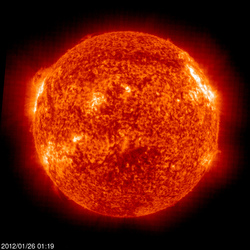 January 26, 2012 John E. Ross, KD8IDJ, Editor
| |||||||||||||
+ Available on ARRL Audio News. + WRC-12: World Radiocommunication Conference 2012 Begins in Switzerland, Considers Secondary MF Amateur Allocation The World Radiocommunication Conference (WRC-12) opened in Geneva, Switzerland on Monday, January 23. Attendees will review and revise the Radio Regulations, the international treaty governing the use of radio frequency spectrum and satellite orbits. One of the items to be considered at WRC-12 is Agenda Item 1.23: To consider an allocation of about 15 kHz in parts of the band 415-526.5 kHz to the Amateur Service on a secondary basis, taking into account the need to protect existing services.
More than 3000 participants -- representing more than 150 out of the International Telecommunication Union's 193 Member States -- are expected to attend the four-week conference. About 100 Observers from among the ITU's 700 private sector members -- along with international organizations, including the International Amateur Radio Union -- are also in attendance. A number of WRC-12 delegates are radio amateurs. Members of the IARU Team include: IARU President Tim Ellam, VE6SH; IARU Vice President Ole Garpestad, LA2RR; IARU Secretary Rod Stafford, W6ROD; IARU Region 1 President Hans Blondeel Timmerman, PB2T; IARU Region 2 President Reinaldo Leandro, YV5AM; IARU Technical Representative Ken Pulfer, VE3PU, and ARRL Chief Executive Officer David Sumner, K1ZZ. ARRL Chief Technology Officer Brennan Price, N4QX, and ARRL Technical Relations Specialist Jon Siverling, WB3ERA, are serving as members of the US delegation. Price is serving as Chairman of the sub-committee that will consider Agenda Item 1.23. Read more here. + Public Service: Hams in Arkansas and Alabama Help Provide Assistance to NWS During Severe Sunday Storms Strong winds and tornadoes moved through Arkansas and Alabama on Sunday, January 22. In response to the storms, the National Weather Service office in Little Rock activated Arkansas SYWARN the same afternoon, while ARES® members were activated in parts of Alabama.
Arkansas SKYWARN Program Coordinator Danny Straessle, KE5WLR, summoned a team of radio amateurs and headed to the NWS office to provide communications support to the forecasters. While Straessle was enroute to the NWS office, Daryl Stout, AE5WX, brought up the Weather Watch Net, a pre-net for Arkansas SKYWARN. By 6 PM, the Arkansas SKYWARN net control team was in place and the NWS issued the first tornado warning for the area. At this time, Straessle and Shane Lee, KF5FBR, took over as Net Control for the Arkansas SKYWARN net. They were assisted by Mona Blacklaw, KM5ONA. The NWS received reports of tornadoes in Arkansas, Dallas, Lonoke, Prairie and Cleveland Counties. In addition to activity by Arkansas SKYWARN, ARES® members in Alabama also helped to provide communications support in that state. According to David Gillespie, W4LHQ, of the Jefferson County Emergency Management Agency, hams across Central Alabama began monitoring the storm conditions in preparation for a possible activation. "Hams deployed to the National Weather Service office to relay storm observations and damage reports," he told the ARRL. "When the NWS issued a tornado warning that evening, local ARES® members began an emergency communications net. Net Control logged reports from 34 stations through the night. When the storms cleared, these damage reports were used to dispatch first responders to the areas that sustained the most severe damage." Fourteen hams reported to the Jefferson County EMA, where Gillespie coordinated communications for three shelters run by the American Red Cross. Read more here. + Logbook of The World to Now Support CQ Awards
The ARRL and CQ Communications, Inc have signed an agreement to begin providing support for CQ-sponsored operating awards by the ARRL's Logbook of the World (LoTW) electronic confirmation system. The agreement was announced jointly on January 24 by ARRL Chief Operating Officer Harold Kramer, WJ1B, and CQ Communications President Richard Ross, K2MGA. CQ's awards will be the first non-ARRL awards supported by LoTW and will be phased in beginning with the CQ WPX award, with additional CQ awards to follow. The ARRL's LoTW system -- an interactive database recording contacts between radio amateurs -- was created in 2003 and has been adopted by 47,500 radio amateurs worldwide. It already has records of 400 million contacts and is growing weekly. The target date for beginning LoTW support for WPX is April 1, 2012. Amateurs will be able to use LoTW logs to generate lists of confirmed contacts to be submitted for WPX credit. Standard LoTW credit fees and CQ award fees will apply. Read more here. + ARRL Foundation Scholarship Application Deadline Fast Approaching
Calling all college students and high school seniors! The ARRL Foundation Scholarship Application Deadline is February 1, less than one week away. Will you be nominated to receive one of the prestigious ARRL Foundation Scholarships? Each year, the ARRL Foundation awards dozens of scholarships to young hams pursuing higher education. The total of these awards tops $80,000. Several hundred of the country's top high school and college students vie for awards ranging from $500 to $5000. Read more here. + FCC News: FCC Denies Anchorage VEC's Waiver Request
On January 24, the FCC issued an Order that denied a waiver request from the Anchorage VEC, one of 14 Volunteer Examiner Coordinators in the US. In its July 2011 Waiver Request, the Anchorage VEC asked the Commission to permit individuals who have previously held an Amateur Radio license grant issued by the Commission -- but which has expired and is beyond the two year grace period for renewal -- to receive credit for elements previously passed, and thus a new license grant, without additional examination. This Waiver Request was in addition to a Petition for Rulemaking filed in April 2011 that asked the FCC to give permanent credit to radio amateurs for examination elements they have successfully passed, effectively creating a license exam credit that would be valid throughout an amateur's lifetime, never expiring. The FCC noted that the denial of the Waiver Request was without prejudice to the Anchorage VEC's pending Petition for Rulemaking, meaning that this denial will have no impact on the pending Petition, and the FCC will still consider it. Read more here. + On the Air: 4U1ITU now 4U1WRC During WRC-12
4U1ITU -- the Amateur Radio station at the ITU -- will be signing as 4U1WRC during the 2012 World Radiocommunication Conference (WRC-12), through February 17. The station will revert to 4U1ITU just in time for the ARRL International DX CW Contest, scheduled for February 18-19. According to ARRL Chief Executive Officer David Sumner, K1ZZ, who is attending WRC-12 as the IARU International Secretariat, the station is in really good shape, with two operating positions capable of going on any two bands at the same time. "A number of delegates are active amateurs, so the station should be quite active for the next several weeks," he said. Amateurs who work 4U1WRC between January 23-February 17, 2012 can receive a special QSL card via the HB9 Bureau or by QSLing direct to IARC, PO Box 6, CH-1211 Geneva 20, Switzerland. ARRL Publications: New Books on HF Digital Operations, Emergency Power Now Shipping The ARRL has just released two new books that you are going to want to have in your shack: Get on the Air with HF Digital by QST Editor Steve Ford, WB8IMY, and Emergency Power for Radio Communications (2nd Edition) by Michael Bryce, WB8VGE.
Get on the Air with HF Digital is a step-by-step guide that will get you started in the fascinating world of HF digital technology. Written in an easy-to-understand, conversational style, this book will show you how to set up and operate your own HF digital station. The text includes instructions for configuring software programs for popular modes such as RTTY, PSK31 and JT65. You'll also learn about other digital communication modes such as MFSK, Olivia and PACTOR. It's a fun and easy way for beginners learn how to get on the air! With Emergency Power for Radio Communications, you will explore the various means of electric power generation for every application -- from charging batteries to keeping the lights on. This book covers the foundation of any communications installation: the power source. Use this book to plan ways to stay on-the-air when weather or other reasons cause a short-term or long-term power outage. Find ways to reach beyond the commercial power grid and identify methods for alternative power generation that will work best in your particular situation, perhaps taking advantage of possibilities already on hand. Emergency Power for Radio Communication, discusses the proper tools for emergency or backup power, energy independence and portable energy. Read more here. International News: Federación Mexicana de Radio Experimentadores Marks 80 Years The Federación Mexicana de Radio Experimentadores (FMRE) -- Mexico's IARU Member-Society -- celebrated its 80th anniversary on January 14. FMRE board members, director and hams from throughout Mexico attended the celebration at FMRE Headquarters in Mexico City.
The FMRE records show that the first time that Amateur Radio activities happened in Mexico occurred in 1918, when students at the National Preparatory School constructed radio equipment. Three years later, the Telegraph Department granted permission to install the first radio stations in the country, and three men -- Francisco Castro Herrera, Carlos Gonzalez and Carlos Palomino -- obtained permission to use a wavelength less than 200 meters. At this time, Mexican wireless operators felt the need for an Amateur Radio organization. In 1922, the Colegio Francés la Liga Nacional de Radio was founded; in 1923, this group created its charter and changed its name to Liga Mexicana de Radio. The Club Central Mexicano de Radio (LCMR) was also founded in 1922. Shortly thereafter, they merged and formed the Liga Central Mexicana de Radio and began holding national meetings and publishing a magazine. In November 1925, the Unión de Radioexperimentadores Mexicanos (UREM) was created, but fell apart four years later. Members from this club applied for IARU membership and organized the Conferencia Nacional de Radioaficionados, the forerunner of the Liga Mexicana de Radioexperimentadores. On January 10, 1932, these radio amateurs founded the Liga Mexicana de Radioexperimentadores. On December 8, 1988, the Liga changed its name to the Federación Mexicana de Radio Experimentadores. For more on the history of the FMRE (in Spanish), please click here. It Now Costs More to Send a Letter or Postcard through the US Mail
On Sunday, January 22, postage rates rose for first class letters, postcards and packages within the US. The cost to mail a first class letter is now 45 cents, an increase of 1 cent. According to the USPS, this is the first increase since May 2009. The cost of mailing a postcard has risen to 32 cents, an increase of 3 cents. This is the second increase for postcard postage in less than a year; in April 2011, the USPS boosted the postcard stamp price from 28 cents to 29 cents. You will also pay more to send letters to Canada, Mexico and other international destinations. Click here for more information on all the postal increases. US District Court for Maine Issues Order Granting Summary Judgment against Glenn Baxter, K1MAN
On January 10, the US District Court for Maine issued a ruling in the FCC's lawsuit to collect monetary forfeitures issued to Glenn Baxter, K1MAN, of Belgrade Lakes, Maine. The FCC had assessed forfeitures in the amount of $21,000 against Baxter on three asserted violations of the Communications Act of 1934 and its regulations: Failure to respond to an FCC inquiry in violation of Title 47, Section 308 of the US Code, willful or malicious interference with other radio transmissions in violation of Section 97.101(d), and engaging in communications in which he has a pecuniary interest in violation of Section 97.113(a)(3). Chief US District Judge John A. Woodcock Jr, in writing for the Court, agreed with the FCC on the first two counts -- willful or repeated failure to respond to FCC requests for information, and willful or malicious interference -- and granted summary judgments to the FCC in the amount of $3000 and $7000, respectively. On the third claim -- communications in which an amateur station licensee or control operator has a pecuniary interest -- the Court declined to grant a summary judgment to the FCC, holding that there were issues of material fact to be litigated in the Court in later proceedings. Find a link to the complete decision here (corrected link). Solar Update
Tad "Staring at the Sun" Cook, K7RA, reports: This was another week where average daily sunspot numbers declined, while average daily solar flux increased. The predicted solar flux is 125 on January 26, 120 on January 27-30, 125 on January 31-February 2, 140 on February 3-8, 145 and 150 on February 9-10, 155 on February 11-13, 150 on February 14-19, and then 145 on February 20-23. That's right -- the long-anticipated short-term solar flux peak of 165 from February 17-21 is gone. The last forecast which still held this number was on January 23, and on January 24 it changed. The predicted planetary A index is 5 on January 26, 8 on January 27-28 and 5 on January 29 to February 7, 8 on February 8-9, and then 5 again on February 10-23. Look for more information on the ARRL website on Friday, January 27. For more information concerning radio propagation, visit the ARRL Technical Information Service Propagation page. This week's "Tad Cookism" is brought to you by U2's Staring at the Sun. This Week in Radiosport This week:
Next week:
All dates, unless otherwise stated, are UTC. See the ARRL Contest Branch page, the ARRL Contest Update and the WA7BNM Contest Calendar for more information. Looking for a Special Event station? Be sure to check out the ARRL Special Event Stations Web page. ARRL Board of Directors: Minutes of 2012 Annual Meeting Posted The minutes of the 2012 Annual Meeting of the ARRL Board of Directors have now been posted to the ARRL Web site. The meeting took place January 13-14 in Windsor, Connecticut. On the Air: RSGB Announces Special Prefixes to Celebrate Diamond Jubilee, Summer Olympics and Paralympic Games The Radio Society of Great Britain (RSGB) and Ofcom -- the British equivalent to the FCC -- have authorized radio amateurs to use special prefixes during 2012 in celebration of Queen Elizabeth II's Diamond Jubilee and the 2012 Summer Olympics and Paralympic Games.
To celebrate the Queen's Diamond Jubilee, all UK radio amateur and club stations can apply to use a special prefix for a five week period, from May 5-June 10. This will add or substitute the letter "Q" in the place of the regional identifier in the call sign. During the Summer Olympics and the Paralympic Games, radio amateurs and club stations can apply to use the letter "O" in the same fashion for a seven week period, from July 21-September 9. Amateurs in the United Kingdom who choose to apply for these special call signs will be using GQ, MQ and 2Q prefixes to celebrate the Diamond Jubilee, and GO, MO and 2O prefixes to celebrate the Olympic and Paralympic Games. In addition, calls in the series GB2012aaa will be available for Special Event Stations relating to the Olympics. Licenses will also be issued for four "flagship" stations using the prefix 2O12a (that's the letter "O," not a zero; "a" is a single letter relating to the location of the station). Upcoming ARRL Section, State and Division Conventions and Events
To find a convention or hamfest near you, click here. ARRL -- Your One-Stop Resource for Amateur Radio News and Information Join or Renew Today! ARRL membership includes QST, Amateur Radio's most popular and informative journal, delivered to your mailbox each month. Subscribe to NCJ -- the National Contest Journal. Published bi-monthly, features articles by top contesters, letters, hints, statistics, scores, NA Sprint and QSO Parties. Subscribe to QEX -- A Forum for Communications Experimenters. Published bi-monthly, features technical articles, construction projects, columns and other items of interest to radio amateurs and communications professionals. Free of charge to ARRL members: Subscribe to the ARES E-Letter (monthly public service and emergency communications news), the ARRL Contest Update (bi-weekly contest newsletter), Division and Section news alerts -- and much more! Find us on Facebook. Follow us on Twitter. ARRL offers a wide array of products to enhance your enjoyment of Amateur Radio Donate to the fund of your choice -- support programs not funded by member dues! Click here to advertise in this newsletter. | |||||||||||||
